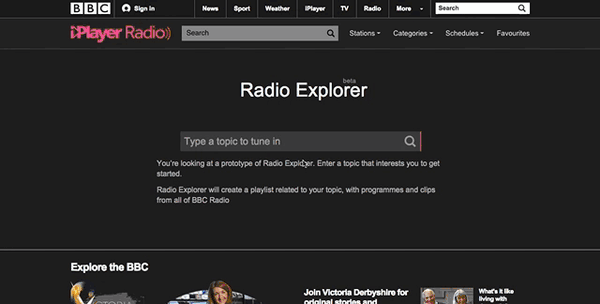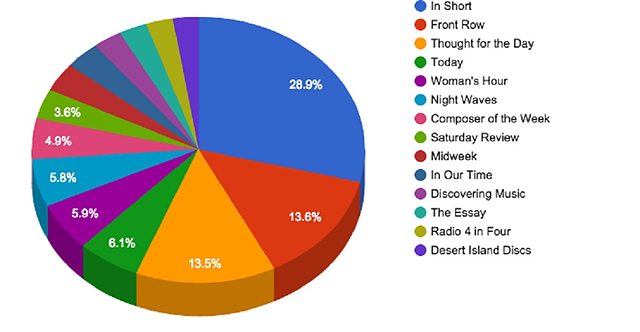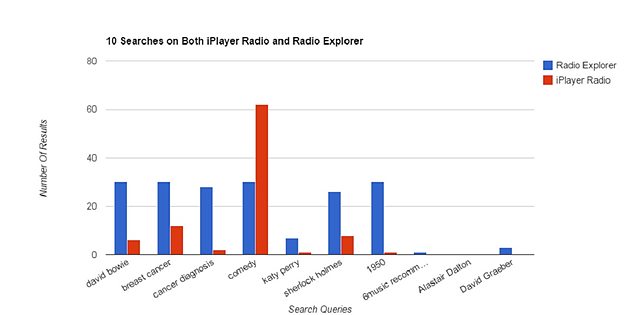Radio Explorer – What we’ve learned
Almost a year ago we put Radio Explorer live, a project that was born from one of our learning and innovation days, a 10% time initiative
What does Radio Explorer do?
It’s not always easy to find radio content across the BBC, especially based on topics you like or interests you have. For instance: I may not be aware of the show name, or presenters on air but at the same time be interested in what I’ve just heard (producers would call me a “light listener”). Perhaps an interview with Lewis Hamilton on Radio 1 had sparked some interest and a listener would like to hear more interviews with him.
So we created an online application which searches not just programmes titles, but subtitles, short synopsis, long synopsis, descriptions, basically anything we can get our hands on! We then made sure any results coming back were available to play, this predominantly included clips (because they don’t expire) and programmes that can currently be played.
Radio Explorer offers you a stream of available content, giving you your own mini radio station of episodes, clips and podcasts which are related to your search term. It’s continuous so you can just leave it to play.
Below is a demo of what Radio Explorer looks like.

(Almost) One year on
Fast forward 8 months and Radio Explorer is on BBC Taster.
When checking feedback most requests were for adding stations such as BBC World Service and Local Radio. So we did exactly this. Radio Explorer now searches through all 57 Radio Stations, giving listeners local content as well as the World Service and music-based interviews from Radio 1 and 6 Music.
Since landing on Taster I was keen to find out what people have been listening to and how long they’ve been listening for.
We have recorded listening times from the past 3 months, i.e measuring how long people listen for and on what brands; these are the results.

Here almost 30% of listens on Radio Explorer have been to an “in Short” clip. Why is this so popular?
In Short, which is Radio 5 Live’s short-form content offering, has a substantial amount of clips in the database (over 4000+), each having a well-filled-out description, meaning they get picked up by Radio Explorer effortlessly. A good description means that Radio Explorer can offer more specific results which users are searching for. The user can also read the description and make a more informed decision to listen or not.
Although listening back to full episodes is available, our listeners seem to be saying short-form content is serving their needs more, at least in this case.
Searches Radio Explorer is always likely to give back content, due to its aggressive keyword searching across all fields in our database
I wanted to see how this fared when compared with the programme search box on the radio home page, here are 10 popular searches performed by users over the past month.
Searches
Radio Explorer is always likely to give back content, due to its aggressive keyword searching across all fields in our database
I wanted to see how this fared when compared with the programme search box on the radio home page, here are 10 popular searches performed by users over the past month.

On average Radio Explorer will almost always give back more results, whereas the radio home page search is currently trying to solve a different problem, namely to get you to the right piece of content. However, entering a category such as ‘comedy‘ will yield far more results (62) than radio explorer’s max which is 30. Seeing that BBC iPlayer Radio’s current search only checks programme titles, specific searches like “Katy Perry”, or “David Bowie” don’t perform too well.
As we move forward and continue to improve BBC iPlayer Radio, I hope we can improve search results across BBC iPlayer Radio and offer audiences a continuous stream to listen to which will include clips & podcasts from across the BBC.
Radio Explorer was active from 29th May 2014 to 15th December 2016